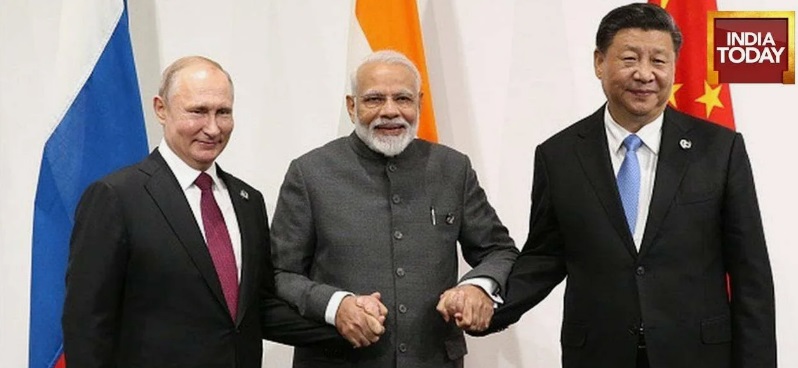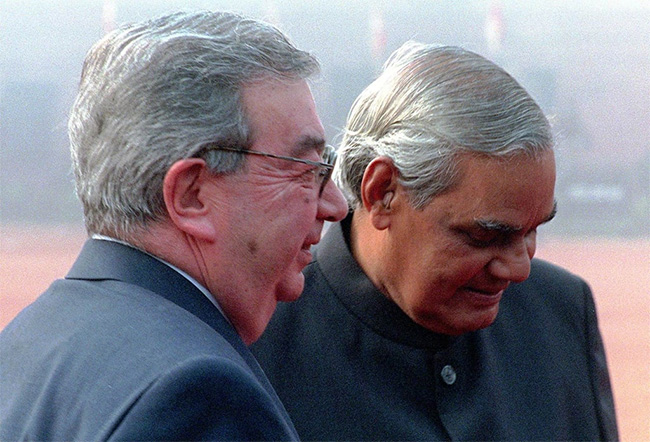
New Delhi’s cautious openness to reviving the long-dormant Russia-India-China dialogue signals a careful hedging of its geopolitical bets, 'South China Morning Post’ stresses.
As friction with the West builds over energy imports and trade, India is weighing a delicate recalibration: reviving its long-dormant trilateral dialogue with Russia and China, even as it insists it remains committed to its partnerships with the US and its allies.
India indicated earlier this month its openness to resuming the Russia-India-China (RIC) dialogue, a platform established in the early 2000s to foster coordination among the three Eurasian powers.
Describing the RIC as a consultative mechanism for addressing shared regional and global challenges, New Delhi’s Ministry of External Affairs emphasised on July 17 that any decision on resuming talks would be taken “in a mutually convenient manner”. No timeline was provided for when this might happen.
The move came just weeks after Russian Foreign Minister Sergey Lavrov had voiced strong support for reviving the format. Speaking at a conference last month, Lavrov reaffirmed Moscow’s desire to “confirm our genuine interest in the earliest resumption of the work within the format of the troika – Russia, India, China – which was established many years ago on the initiative of former Russian prime minister Yevgeny Primakov”.
 Former Russian PM Yevgeny Primakov (left) with his Indian counterpart Atal Behari Vajpayee in 1998, the year he called for the creation of a “strategic triangle” between Russia, India and China.
Former Russian PM Yevgeny Primakov (left) with his Indian counterpart Atal Behari Vajpayee in 1998, the year he called for the creation of a “strategic triangle” between Russia, India and China.
Photo: AFP
Analysts suggest the impetus behind India’s overture stems from growing frustration with what it perceives as Western “double standards”. Sriparna Pathak, a professor of China studies and international relations at O.P. Jindal Global University in India, pointed to recent warnings from NATO chief Mark Rutte that India could face “100 per cent secondary sanctions” for buying Russian oil.
Pathak said India had consistently maintained that securing its energy needs was an “overriding priority” and had previously “called out the hypocrisy” of European nations who continue to import substantial amounts of Russian oil and gas.
EU member states bought €21.9 billion (US$25.72 billion) worth of Russian oil and gas in the third year of the Ukraine war – one-sixth more than the €18.7 billion allocated to Kyiv in financial aid in 2024, according to the Helsinki-based Centre for Research on Energy and Clean Air think tank.
Another factor was the United States’ “transactionalism” under Donald Trump, Pathak said. The India-US bilateral trade deal was stalled due to “hypocrisy and constant and unnecessary threats of tariffs” from Washington, she said, particularly regarding access to India’s agricultural sector.
While China “is simply not a choice for India”, she argued that Russia was a viable partner, having “not engaged in hypocrisy in ways that the US has”.
“This is the biggest reason for the rumblings behind RIC,” Pathak said. “India chooses its own national interests and will not give in to bullying.”
Gaurav Kumar, a researcher at the United Service Institution of India, a defence and security think tank, noted that with India set to chair Brics next year, Delhi was keen to demonstrate its capacity to act as a “stabiliser” able to engage both the West and Russia.
China’s recent gestures, including reopening the Kailash-Mansarovar pilgrimage route for the first time since the pandemic and hosting regional forums, signalled a willingness to “reset the tone”, Kumar said.
“Reviving the RIC offers a stabilising platform that may ease tensions, not escalate them, by fostering dialogue among key regional players,” he said.
“Beijing’s recent steps have opened the door, now it is up to all three nations to walk through it.”
read more in our Telegram-channel https://t.me/The_International_Affairs

 11:13 31.07.2025 •
11:13 31.07.2025 •






















